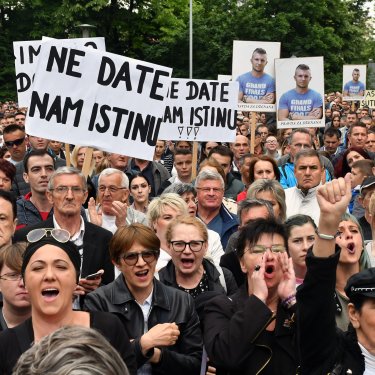RSF sounds alarm after TV reporter badly beaten in Banja Luka

Reporters Without Borders (RSF) calls for a firm reaction from the authorities in Republika Srpska, the autonomous Serbian part of Bosnia and Herzegovina, to a brutal attack on Vladimir Kovačević, an investigative reporter for BN TV, the region’s leading TV news channel.
Kovačević was very badly injured when two masked men beat him with steel bars outside his home in Banja Luka, the de facto capital of Republika Srpska, on the night of 26 August. He had just covered the latest in a series of opposition protests by the “Truth for David” movement, which he has been following for several months.
The local media are appalled by the attack, which the police immediately described as a “murder attempt” and which, in the eyes of all of the country’s journalists and media unions, was clearly targeted. Kovačević had received serious threats on social networks and had repeatedly reported them to the police, but the police never took any action.
“The situation in Bosnia has reached a critical point,” said Pauline Adès-Mével, the head of RSF’s EU-Balkans desk. “This attack, the violence of which is extremely shocking and worrying, requires a firm and determined response from the judicial authorities, especially in the run-up to general elections that will be watched by the international community. We call on President Milorad Dodik to stop insulting the country’s journalists so that the verbal violence does not open the way to more physical attacks.”
There have been threats against other BN TV journalists covering the “Truth for David” movement, which began in March after the police concluded that student David Dragičević’s death was “accidental” although his family and civil society are convinced that he was the victim of a politically-motivated killing. He has become a symbol of revolt against political corruption and his death is the subject of almost daily street protests.
Zeljko Raljić, who heads BN TV’s operations in Banja Luka and is the Bosnian Centre for Press Freedom’s president, said: “This attack is a clear threat both to BN TV’s journalists and to all journalists in Bosnia and Herzegovina because the revolt over David’s murder is bothering the country’s authorities.”
Raljić added: “What’s more, with less than two months to go to the general elections scheduled for 7 October, this attack is highly political in nature, because journalists are constantly denouncing the government’s grip on the police and corruption in the judicial system.”
The tension has been fuelled by recent verbal attacks by Republika Srpska President Milorad Dodik, who described BN TV as a “traitor or enemy” and by claims that certain journalist are spies in the pay of other countries.
The identity of Kovačević’s assailants is not yet known by those close to him regard it as a politically-motivated attack designed to deter him and his colleagues from continuing to cover the anti-government demonstrations.
Bosnia and Herzegovina is ranked 62nd out of 180 countries in RSF's 2018 World Press Freedom Index. The political polarization, constant verbal attacks and nationalist rhetoric do not constitute an environment that favours press freedom.



